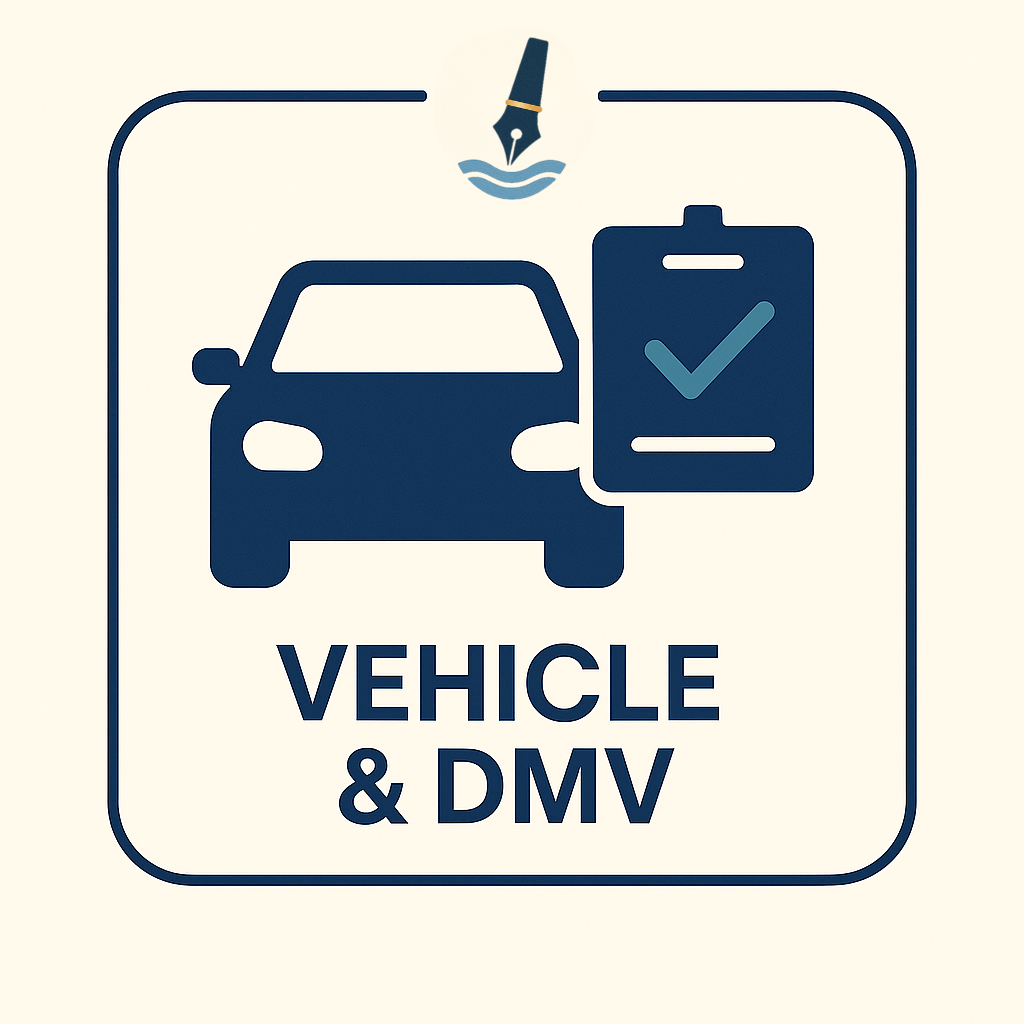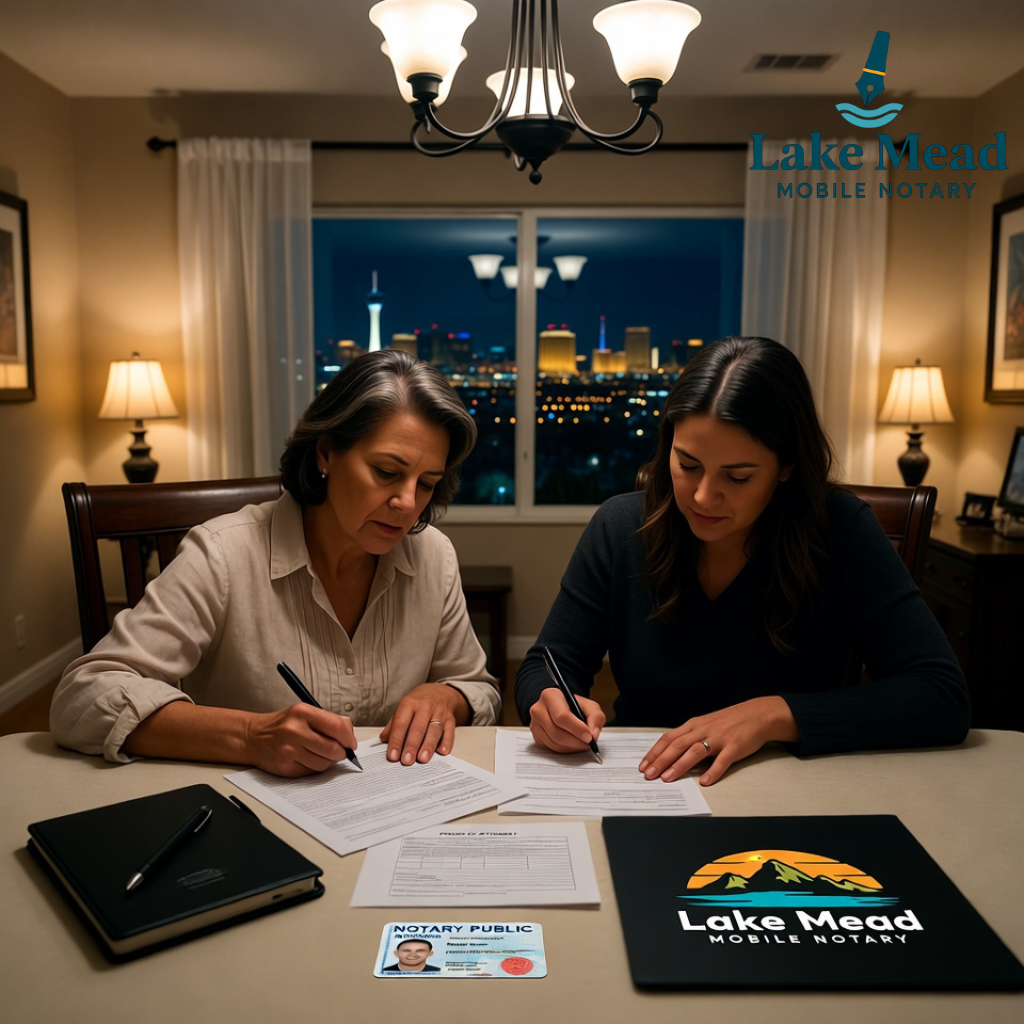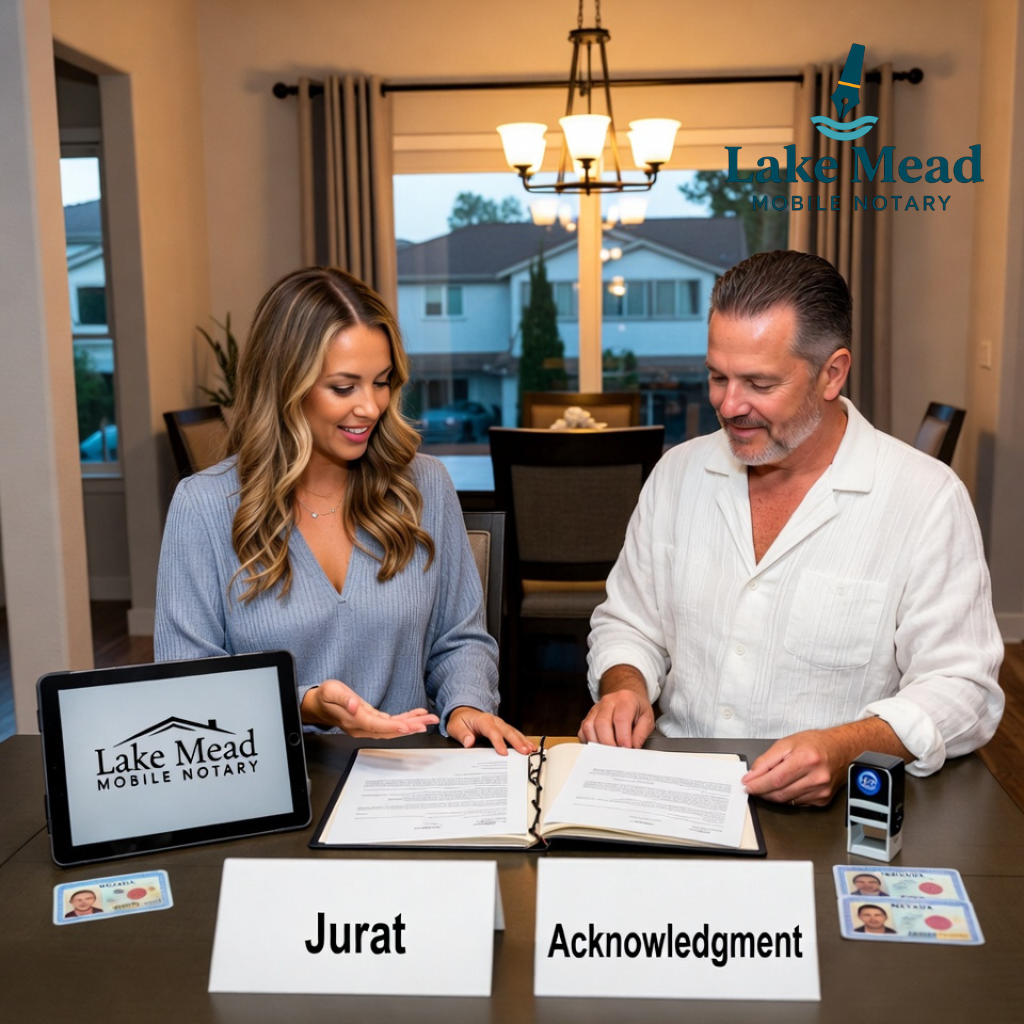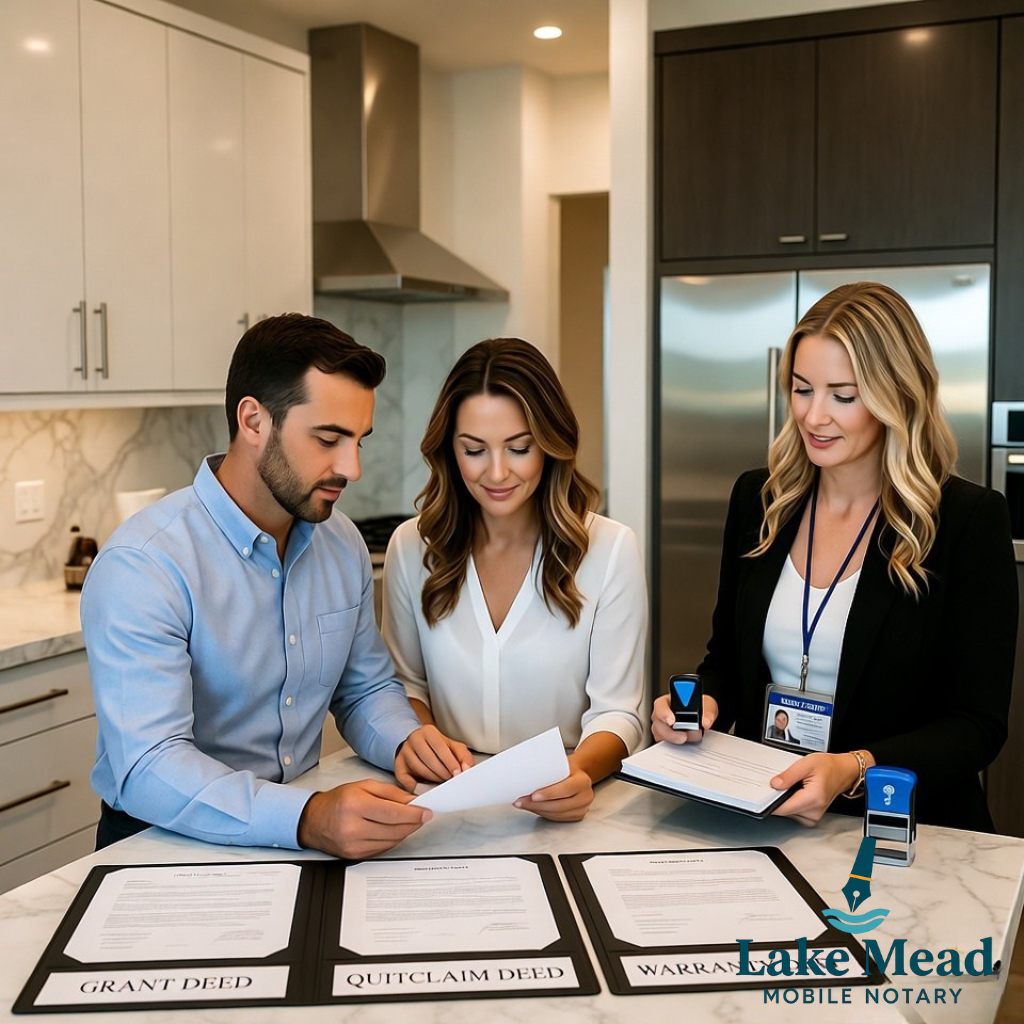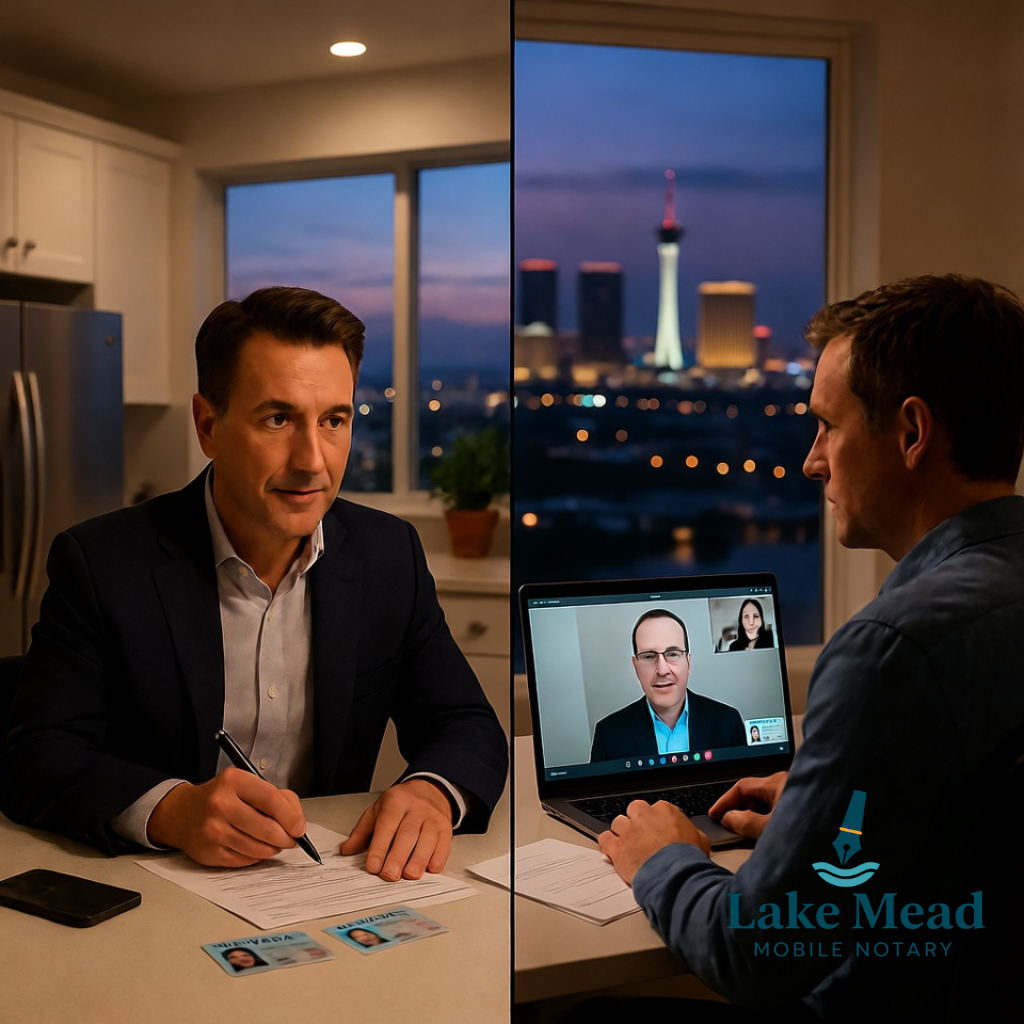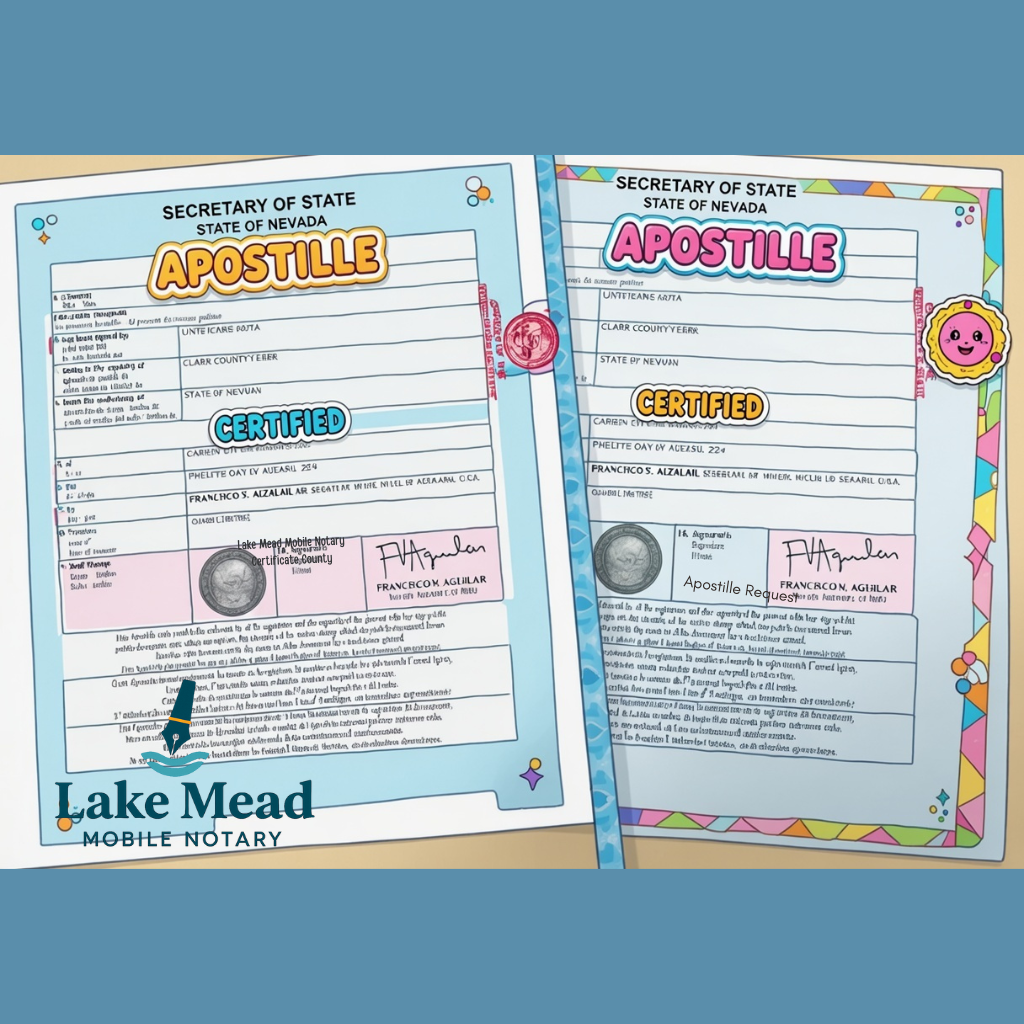Vehicle Authorization Letter Nevada: Complete 2025 DMV & Tow Yard Guide
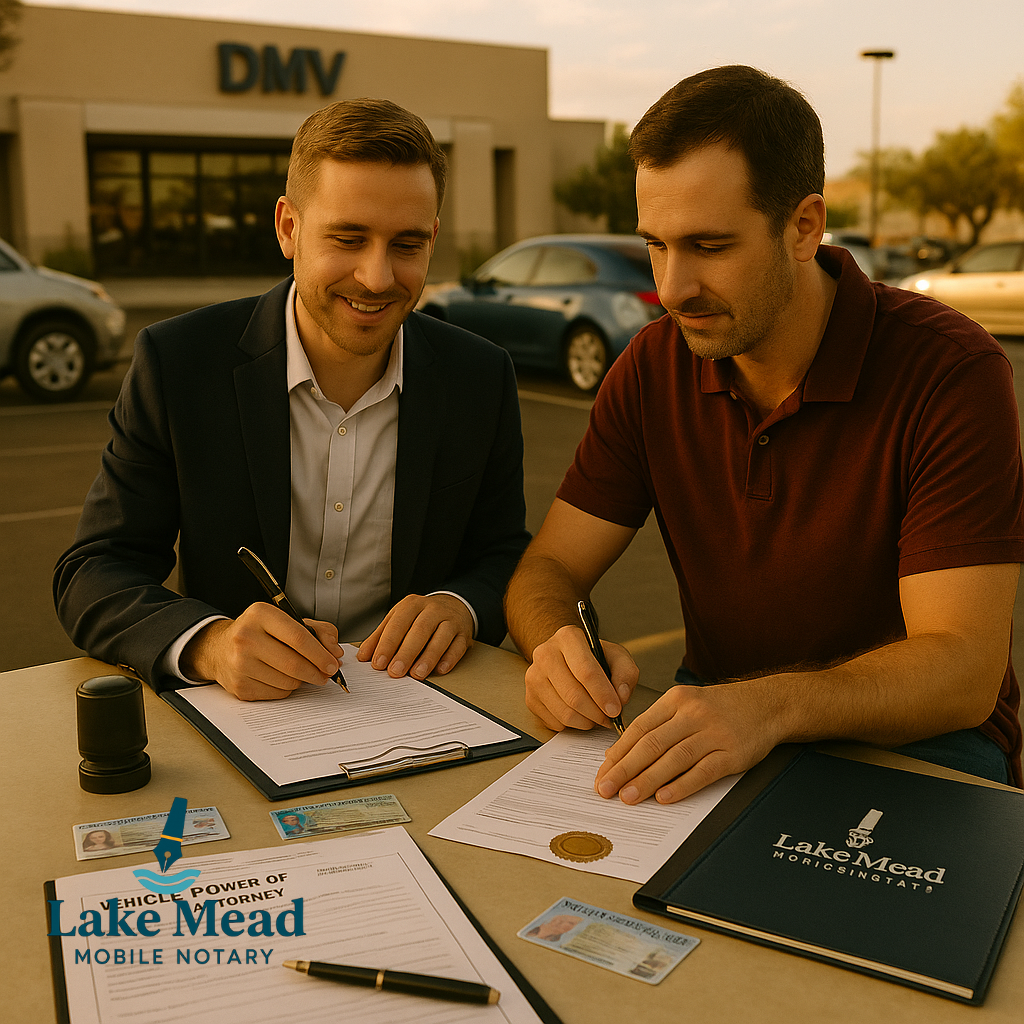
A vehicle authorization letter is a document granting another person permission to handle vehicle-related transactions on your behalf in Nevada, including DMV registration, title transfers, tow yard releases, and lienholder communications. The most common authorization is Nevada DMV Form VP-136 Power of Attorney for Vehicle, which MUST be notarized per state law before the DMV will accept it for any vehicle transaction. Lake Mead Mobile Notary provides same-day mobile notarization for VP-136 forms and vehicle authorization letters at DMV offices, tow yards, auction houses, and throughout Las Vegas, Henderson, North Las Vegas, and all of Clark County. Licensed Nevada notaries travel directly to Henderson DMV, Ewing Brothers Towing, AA Action Towing, Copart Las Vegas, and IAA Las Vegas to verify signer identity, witness signatures, and complete notarial certificates properly. Common vehicle authorization situations include retrieving impounded vehicles from tow yards for registered owners, authorizing out-of-state family members to register vehicles, obtaining lienholder permission letters for DMV registration, granting power of attorney to dealers for title work, and authorizing personal property retrieval from repossessed vehicles. Without proper notarization of VP-136 forms Nevada DMV will reject all vehicle transactions causing registration delays title transfer complications and additional tow yard storage fees throughout Southern Nevada.
A vehicle authorization letter is a document granting another person permission to handle vehicle transactions on your behalf in Nevada, including DMV registration, title transfers, tow yard releases, and lienholder communications. Lake Mead Mobile Notary provides same-day mobile notarization for Nevada VP-136 Power of Attorney forms and vehicle authorization letters at DMV offices, tow yards, and throughout Las Vegas, Henderson, and Clark County with licensed Nevada notaries who travel directly to your location.
Critical Nevada Law Requirement: The Nevada DMV Form VP-136 Power of Attorney for Vehicle MUST be notarized per state law before the DMV will accept it. Generic authorization letters on plain paper will be rejected for all vehicle registration, title transfer, and lien transactions. This comprehensive guide covers when vehicle authorization is needed, notarization requirements, real problems people face at tow yards and DMV, and how mobile notary services solve urgent vehicle situations.
If you need someone to handle vehicle transactions at Nevada DMV on your behalf, you must use the official Nevada DMV Form VP-136 Power of Attorney for Vehicle. Simple authorization letters, even if notarized, will be rejected.
The VP-136 grants your agent (the person you authorize) specific powers to act on your behalf at Nevada DMV for:
Nevada Law Requirement: The VP-136 MUST be notarized. The form includes a jurat notarial certificate requiring you to appear before a Nevada notary public, swear or affirm that the information is true, and sign in the notary's physical presence. Pre-signed forms are invalid and will be rejected by all Nevada DMV locations.
Out-of-State Owners: If you moved out of Nevada but still own a vehicle registered here, VP-136 allows a local friend, family member, or dealer to handle renewals, title transfers, or registration cancellations without you traveling back to Nevada.
Deployed Military: Active-duty service members stationed overseas frequently authorize spouses or family members to register newly purchased vehicles, renew registrations, or handle title transfers while deployed.
Hospitalized or Elderly Owners: When vehicle owners are hospitalized, in assisted living, or have mobility challenges preventing DMV visits, VP-136 authorizes caregivers or family members to handle all vehicle paperwork.
Vehicle Sale While Traveling: If you're selling your vehicle but will be out of state or country during the transaction, VP-136 allows the buyer or a dealer to complete title transfer at DMV without your physical presence.
Dealership Trade-Ins: When trading in a vehicle, dealerships often request VP-136 authorization to process title transfers, lien releases, and DMV paperwork on your behalf for faster processing.
One of the most common vehicle authorization situations involves retrieving impounded vehicles from tow yards when the registered owner cannot personally pick up the vehicle.
Nevada tow yards including Ewing Brothers Towing, AA Action Towing, Ace Towing, and Ashley's Towing require notarized authorization letters when:
Real Problem Scenarios: "My cousin's car got towed an hour after he left for his two-week honeymoon in Greece. The impound lot says I need a notarized letter to get his car. He's in Greece and can't get anything notarized! This is going to cost $1,200 in impound fees by the time he gets back. What do I do?"
Solution: U.S. embassies and consulates provide notary services for U.S. citizens abroad. The owner can have the authorization letter notarized at the nearest U.S. embassy/consulate and overnight the original to the authorized person for tow yard presentation.
Most tow yards require the original notarized letter—not a photocopy or fax. The authorized person must also present their government-issued photo ID matching the name on the authorization letter.
When you finance a vehicle, the lienholder (bank, credit union, auto finance company) holds the title until you pay off the loan. If you move to a new state or need to register the vehicle, you may need a lienholder permission letter.
Real Problem Scenario: "I relocated from New Jersey to New York and I'm trying to register my vehicle in NY. JP Morgan Chase holds the lien. NY DMV says Chase needs to send them a Letter of Permission to Register, but when I call Chase they say the DMV has to request it directly. DMV says I have to request it from Chase myself. Nobody will send the letter! What do I do?"
Common Issue: This is a frequent problem when moving between states with financed vehicles. Some lienholders will send permission letters directly to you, others only send them to DMV offices on letterhead requests, and some don't understand what's being requested because they use different terminology internally.
Solutions:
Real Problem Scenario: "I have a New York Secure Power of Attorney for my vehicle, but Nevada DMV won't accept it for my Nevada title transfer. They're telling me I need a Nevada VP-136. Is this legal?"
Answer: Yes, it's legal and correct. Nevada DMV will NOT accept out-of-state power of attorney forms for Nevada vehicle transactions, even "secure" POAs from other states. You must use Nevada's official VP-136 form, properly completed and notarized by a Nevada notary public. This is true for all state-specific DMV forms—each state requires its own official forms.
Workaround: If you're out of state, you can complete the VP-136, have it notarized in your current state by any commissioned notary (doesn't have to be a Nevada notary for this purpose—the notary just can't be commissioned in a foreign country), and mail the original to your Nevada agent who will present it to Nevada DMV.
Real Problem Scenario: "I gave my friend a notarized VP-136 to register my car at Nevada DMV, but they rejected everything because he didn't write 'P.O.A.' next to his signature on the forms. Now we have to start over with new forms. Is this really necessary?"
Answer: Yes, absolutely required. Nevada law requires any agent acting under power of attorney to write "P.O.A." or "Power of Attorney" next to their signature on EVERY form they sign on behalf of the principal (vehicle owner). This notation alerts DMV staff that the person signing is an agent, not the owner.
Correct signature format: If John Smith has power of attorney from Mary Johnson, John signs DMV forms as:
"John Smith, P.O.A." or "John Smith POA for Mary Johnson"
Without this notation, DMV staff process the signature as if John IS the owner, creating title and registration complications that can take months to unravel.
Real Problem Scenario: "I'm buying a car from someone who says he has power of attorney from the owner. How do I make sure this is legit? Can the DMV reject the title transfer later?"
Answer: This is risky. If someone is selling a vehicle using power of attorney, demand to see:
Nevada DMV will accept POA signatures on title transfers IF the agent writes "P.O.A." next to their signature and has proper written authority. However, if the POA was revoked, the owner died, or the agent exceeded their authority, the title transfer can be challenged later—leaving you without a valid title to the vehicle you paid for.
Safest approach: Insist on having the actual vehicle owner sign the title, even if it requires scheduling when they're available. If that's impossible and you proceed with POA, get the sale agreement AND the power of attorney both notarized, and consider title insurance or an attorney review for higher-value vehicles.
Real Problem Scenario: "The dealership sent me a power of attorney form for vehicle registration but left the line for who I'm giving power of attorney TO completely blank. My notary won't notarize it because she says it's incomplete. Is this normal?"
Answer: Yes, this is common dealership practice. Many dealers leave the agent name blank because they have multiple employees who handle DMV work, and they don't know which specific person will file your registration paperwork when it arrives. Nevada DMV accepts POAs with blank agent lines for dealership use because the POA authority is limited solely to vehicle registration—the dealer can't do anything else with it.
However, some notaries refuse to notarize documents with blank critical fields because it creates potential fraud risk. If your notary won't proceed, you have two options:
Mobile notaries experienced with automotive transactions routinely notarize dealership POAs with blank agent lines because we understand this is standard industry practice for the limited purpose of vehicle registration.
Step 1: Download Current VP-136 Form
Obtain the most recent version from dmv.nv.gov/pdfforms/vp136.pdf. Nevada DMV periodically updates forms—using an outdated version causes rejection.
Step 2: Complete All Required Fields
Fill in your (principal's) information: full legal name, current address, Nevada driver's license number or state ID number. Complete vehicle information: 17-digit VIN, year, make, model, license plate number. Identify your agent: their full legal name and current address.
Step 3: Specify Powers Granted
Check the boxes for specific authorities you're granting: register vehicle, transfer title, record lien, apply for duplicate title, etc. Only check the boxes for powers you actually want to grant—don't give blanket authority unless necessary.
Step 4: Set Expiration Date
VP-136 forms remain valid until you revoke them or until the expiration date you specify. For one-time transactions, set an expiration 30-60 days out. For ongoing authority (family member handling all your vehicle matters), you can set longer periods or leave it open-ended.
Step 5: Do NOT Sign Yet
Complete everything EXCEPT your signature. Nevada notaries cannot notarize pre-signed documents—you must sign in their physical presence after taking an oath.
Step 6: Schedule Mobile Notary Service
Contact Lake Mead Mobile Notary at (702) 748-7444 or book online. We travel to your location throughout Las Vegas, Henderson, North Las Vegas, Spring Valley, and all of Clark County. We can meet you at Henderson DMV parking lots before your appointment, at tow yards, or at your home/office.
Step 7: Present Valid Government ID
You must have current, unexpired government-issued photo identification: Nevada driver's license, passport, state ID card, or military ID. The notary will verify your identity before proceeding.
Step 8: Take Oath & Sign Before Notary
The notary administers an oath: "Do you solemnly swear or affirm that the information in this power of attorney is true and correct?" After you affirm, sign the VP-136 exactly as your name appears on your identification.
Step 9: Notary Completes Jurat & Applies Seal
The notary fills in the jurat certificate section with the date, Nevada county where the oath occurred, your name, and applies their official Nevada notary seal and signature. The entire process takes 15-20 minutes.
Step 10: Provide Original to Your Agent
Give the original notarized VP-136 to your agent. Make a copy for your records. Your agent must present the original (not a copy) to Nevada DMV when conducting transactions on your behalf, and must write "P.O.A." next to their signature on all DMV forms.
Traditional notarization requires you to find a notary office, travel there during business hours, and coordinate timing with all parties. For vehicle situations—especially urgent tow yard releases or time-sensitive DMV transactions—this creates massive complications.
Need VP-136 notarized before your Henderson DMV appointment? We meet you in the parking lot 15-30 minutes before your scheduled time, complete notarization in your vehicle or at a nearby table, and you walk into DMV with properly executed forms ready to go.
Lake Mead Mobile Notary travels to all major Clark County tow facilities including Ewing Brothers, AA Action, Ace Towing, and Ashley's Towing. We meet vehicle owners or authorized persons at the yard office, notarize authorization letters on-site, and you immediately present the notarized letter to retrieve your vehicle—eliminating multiple trips and additional storage fees.
Purchased a vehicle at Copart or IAA Las Vegas and need POA or authorization documents notarized for title transfer? We provide on-site notarization at auction facilities, coordinating with your pickup schedule for same-day vehicle release.
Vehicle impounded and you leave for deployment tomorrow? Car towed and the yard closes in 2 hours? We offer emergency and after-hours notarization appointments for urgent vehicle authorization situations throughout Paradise, Sunrise Manor, Enterprise, and Boulder City.
No. Nevada DMV will only accept their official VP-136 form for vehicle transactions. Generic authorization letters on plain paper, even if notarized, will be rejected for all registration, title transfer, and lien transactions. The VP-136 is specifically designed to meet Nevada legal requirements and DMV processing needs. Other states have similar requirements for their own official POA forms—you must use the form specified by the state's DMV.
No. Only you (the principal/vehicle owner) need to appear before the notary to sign the VP-136. Your agent does not need to sign the form or be present during notarization. The form identifies who your agent is, but they simply receive the notarized document from you and use it when conducting DMV transactions on your behalf. The agent must present the original notarized VP-136 to DMV and write "P.O.A." next to their signature on all forms.
VP-136 forms remain valid until: the expiration date you specify on the form, you submit written revocation to Nevada DMV, or the transaction(s) specified in the POA are completed. For single transactions (registering one vehicle), setting a 30-60 day expiration is common. For ongoing authority (family member handling all your vehicle matters indefinitely), you can leave it open-ended or set it for multiple years. Always specify an expiration date rather than leaving it completely open to limit potential misuse.
No. All Nevada tow yards require written authorization, and most require notarized authorization letters for non-owner releases. Verbal permission, text messages, or emails are not sufficient. The vehicle owner must provide a written authorization letter with their original signature, preferably notarized, identifying you by name and specifying they authorize you to retrieve their vehicle. You must also present your government ID matching the name on the authorization letter. This protects tow yards from liability if the owner later disputes the release.
If your agent loses the notarized VP-136, you must execute a new one with new notarization. Nevada DMV requires original notarized POA forms—photocopies or re-notarizations of copies are not accepted. The good news: executing a new VP-136 is straightforward. Complete a fresh form, sign it before a notary, and provide the new original to your agent. If you're concerned about potential misuse of the lost VP-136, you can file written revocation with Nevada DMV stating the specific VP-136 (by date) is revoked, and provide your agent with a newly executed replacement.
🚗 Nevada DMV VP-136 Power of Attorney Notarization
Mobile notarization of official Nevada DMV vehicle power of attorney forms for registration, title transfers, and lien transactions throughout Las Vegas Valley.
🔐 VP-221 Secure Power of Attorney
Nevada DMV secure POA form on security paper used when vehicle title is lost or held by lienholder, with mobile notarization service.
🚛 Tow Yard Notarization Service
On-site notarization at all Clark County tow yards for vehicle release authorization letters and related impound documentation.
📋 Impound Non-Owner Vehicle Release
Authorization letters allowing third parties to retrieve impounded vehicles on behalf of registered owners with tow yard coordination.
⚖️ VP-020 Repossession Affidavit Notarization
Nevada DMV repossession affidavit notarization for lienholders processing title transfers after vehicle repossession.

